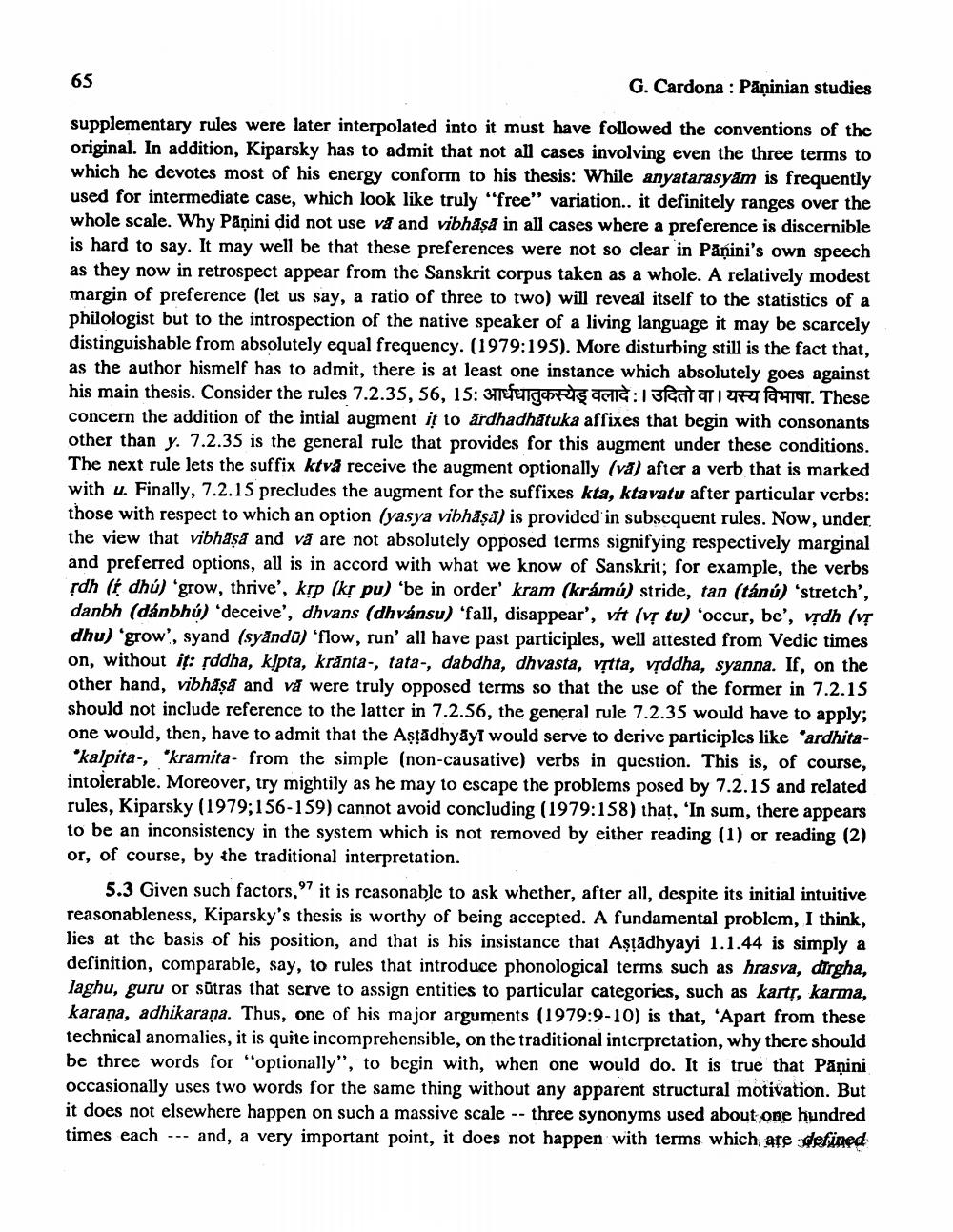________________
G. Cardona : Paninian studies
supplementary rules were later interpolated into it must have followed the conventions of the original. In addition, Kiparsky has to admit that not all cases involving even the three terms to which he devotes most of his energy conform to his thesis: While anyatarasyam is frequently used for intermediate case, which look like truly "free" variation.. it definitely ranges over the whole scale. Why Panini did not use va and vibhāṣa in all cases where a preference is discernible is hard to say. It may well be that these preferences were not so clear in Panini's own speech as they now in retrospect appear from the Sanskrit corpus taken as a whole. A relatively modest margin of preference (let us say, a ratio of three to two) will reveal itself to the statistics of a philologist but to the introspection of the native speaker of a living language it may be scarcely distinguishable from absolutely equal frequency. (1979:195). More disturbing still is the fact that, as the author hismelf has to admit, there is at least one instance which absolutely goes against his main thesis. Consider the rules 7.2.35, 56, 15 आर्धधातुकस्ये वलादेः उदितो वा यस्य विभाषा. These concern the addition of the intial augment it to ardhadhätuka affixes that begin with consonants other than y. 7.2.35 is the general rule that provides for this augment under these conditions. The next rule lets the suffix ktvä receive the augment optionally (va) after a verb that is marked with u. Finally, 7.2.15 precludes the augment for the suffixes kta, ktavatu after particular verbs: those with respect to which an option (yasya vibhasa) is provided in subsequent rules. Now, under the view that vibhāṣa and va are not absolutely opposed terms signifying respectively marginal and preferred options, all is in accord with what we know of Sanskrit; for example, the verbs rdh (t dhú) 'grow, thrive', krp (kr pu) 'be in order' kram (krámú) stride, tan (tánú) 'stretch', danbh (dánbhú) 'deceive', dhvans (dhvánsu) 'fall, disappear', vit (vr tu) occur, be', vrdh (vr dhu) 'grow, syand (syando) 'flow, run' all have past participles, well attested from Vedic times on, without it: rddha, kipta, kranta-, tata-, dabdha, dhvasta, vtta, vṛddha, syanna. If, on the other hand, vibhāṣa and va were truly opposed terms so that the use of the former in 7.2.15 should not include reference to the latter in 7.2.56, the general rule 7.2.35 would have to apply; one would, then, have to admit that the Astädhyay would serve to derive participles like "ardhita"kalpita, "kramita from the simple (non-causative) verbs in question. This is, of course, intolerable. Moreover, try mightily as he may to escape the problems posed by 7.2.15 and related rules, Kiparsky (1979;156-159) cannot avoid concluding (1979:158) that, 'In sum, there appears to be an inconsistency in the system which is not removed by either reading (1) or reading (2) or, of course, by the traditional interpretation.
65
5.3 Given such factors," it is reasonable to ask whether, after all, despite its initial intuitive reasonableness, Kiparsky's thesis is worthy of being accepted. A fundamental problem, I think, lies at the basis of his position, and that is his insistance that Astädhyayi 1.1.44 is simply a definition, comparable, say, to rules that introduce phonological terms such as hrasva, dirgha, laghu, guru or sütras that serve to assign entities to particular categories, such as karty, karma, karana, adhikarana. Thus, one of his major arguments (1979:9-10) is that, 'Apart from these technical anomalies, it is quite incomprehensible, on the traditional interpretation, why there should be three words for "optionally", to begin with, when one would do. It is true that Panini occasionally uses two words for the same thing without any apparent structural motivation. But it does not elsewhere happen on such a massive scale -- three synonyms used about one hundred times each and, a very important point, it does not happen with terms which are defined




